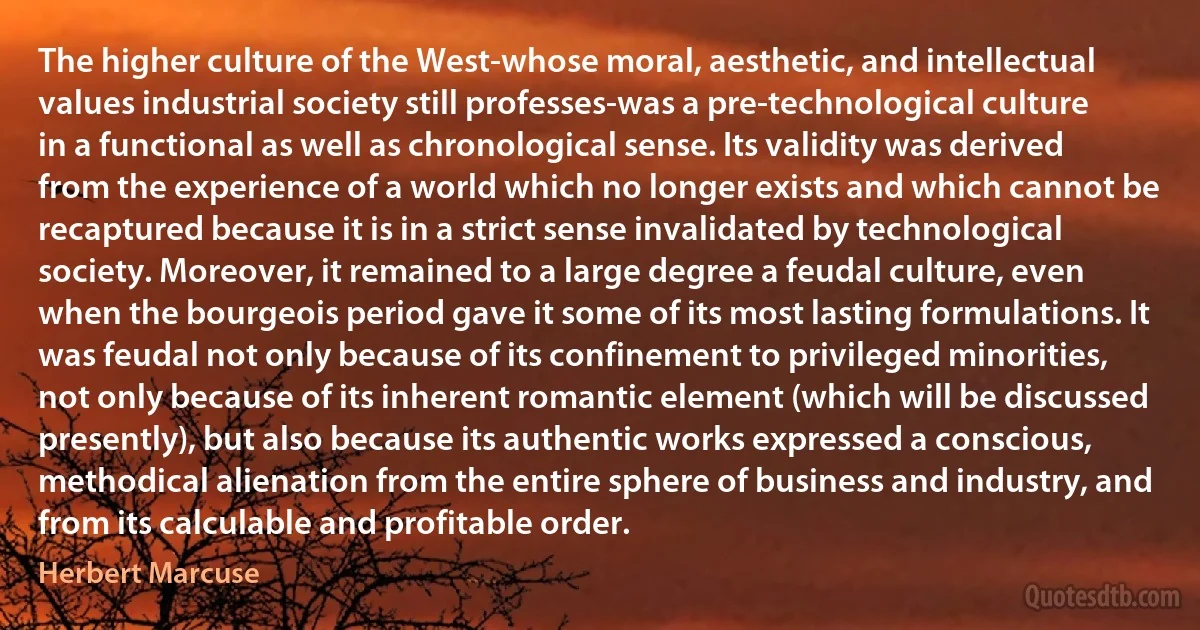
The higher culture of the West-whose moral, aesthetic, and intellectual values industrial society still professes-was a pre-technological culture in a functional as well as chronological sense. Its validity was derived from the experience of a world which no longer exists and which cannot be recaptured because it is in a strict sense invalidated by technological society. Moreover, it remained to a large degree a feudal culture, even when the bourgeois period gave it some of its most lasting formulations. It was feudal not only because of its confinement to privileged minorities, not only because of its inherent romantic element (which will be discussed presently), but also because its authentic works expressed a conscious, methodical alienation from the entire sphere of business and industry, and from its calculable and profitable order.
Herbert MarcuseRelated topics
aesthetic alienation authentic bourgeois business confinement degree element entire experience functional industrial industry intellectual large lasting longer order romantic sense validity well world works higherRelated quotes
The animating purpose of James was, on the other hand, primarily moral and artistic. It is expressed in his phrase, "block universe," employed as a term of adverse criticism. Mechanism and idealism were abhorrent to him because they both hold to a closed universe in which there is no room for novelty and adventure. Both sacrifice individuality and all the values, moral and aesthetic, which hang upon individuality; for according to absolute idealism, as to mechanistic materialism, the individual is simply a part determined by the whole of which he is a part. Only a philosophy of pluralism, of genuine indetermination, and of change which is real and intrinsic gives significance to individuality. It alone justifies struggle in creative activity and gives opportunity for the emergence of the genuinely new.

John Dewey
I used to be a hide-bound Tory simply for traditional and antiquarian reasons-and because I had never done any real thinking on civics and industry and the future. The depression-and its concomitant publicisation of industrial, financial, and governmental problems-jolted me out of my lethargy and led me to reëxamine the facts of history in the light of unsentimental scientific analysis; and it was not long before I realised what an ass I had been. The liberals at whom I used to laugh were the ones who were right-for they were living in the present while I had been living in the past. They had been using science while I had been using romantic antiquarianism. At last I began to recognise something of the way in which capitalism works-always piling up concentrated wealth and impoverishing the bulk of the population until the strain becomes so intolerable as to force artificial reform.

H. P. Lovecraft
How far down the evolutionary scale shall we go? Shall we eat fish? What about shrimps? Oysters? To answer these questions we must bear in mind the central principle on which our concern for other beings is based. As I said ... the only legitimate boundary to our concern for the interests of other beings is the point at which it is no longer accurate to say that the other being has interests. To have interests, in a strict, nonmetaphorical sense, a being must be capable of suffering or experiencing pleasure. If a being suffers, there can be no moral justification for disregarding that suffering, or for refusing to count it equally with the like suffering of any other being. But the converse of this is also true. If a being is not capable of suffering, or of enjoyment, there is nothing to take into account.

Peter Singer
We are honored for research which is today referred to as the "Two Neutrino Experiment". How does one make this research comprehensible to ordinary people? In fact "The Two Neutrinos" sounds like an Italian dance team. How can we have our colleagues in chemistry, medicine, and especially in literature share with us, not the cleverness of our research, but the beauty of the intellectual edifice, of which our experiment is but one brick? This is a dilemma and an anguish for all scientists because the public understanding of science is no longer a luxury of cultural engagement, but it is an essential requirement for survival in our increasingly technological age: In this context, I believe this Nobel Ceremony with its awesome tradition and pomp has as one of its most important benefits; the public attention it draws to science and its practitioners.

Leon M. Lederman
You have the opportunity to be more than spectators, you can be actors in the revolution, writing about it, expressing yourselves about it. And the generations to come, what will they ask of you? You might produce magnificent artistic works from a technical point of view, but if you were to tell someone from the future generation, 100 years from bow, that a writer, an intellectual, lived in the era of the revolution and did not write about the revolution, and was not a part of the revolution, it would be difficult for a person in the future to understand this. In the years to come there will be so many people who will want to paint about the revolution, to write about the the revolution, to express themselves on the revolution, compiling data an information in order to know what it was like, what happened, how we used to live.

Fidel Castro
